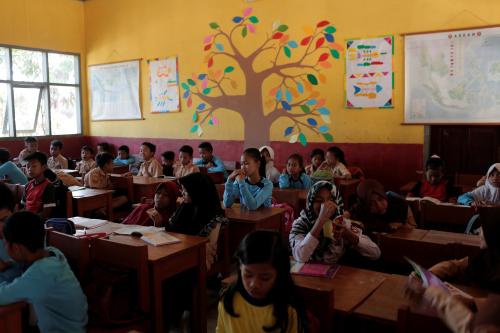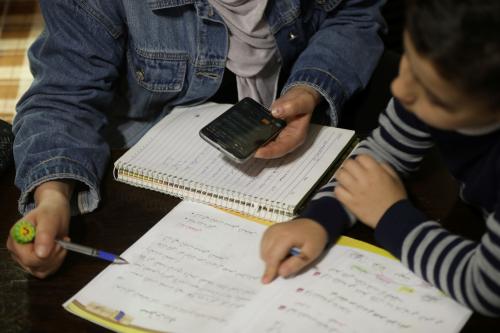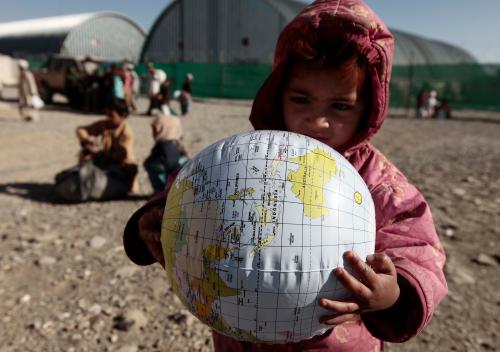This blog is a summary of the new report, “Millions Learning Real-time Scaling Labs: Emerging findings and key insights.”
As we face a global health pandemic, a severe economic downturn, and a growing movement in response to systemic racism, innovative education initiatives that address these and other complex, structural challenges are being tested in every corner of the world. The key question remains, however, how these efforts can be effectively, equitably, and sustainably scaled.
Through the Millions Learning Real-time Scaling Labs action research project, we have had the privilege to learn alongside our partners in the process of scaling some of these innovative education initiatives in Botswana, Côte d’Ivoire, Jordan, the Philippines, and Tanzania. While there is much diversity across these five labs—some have been initiated by NGOs while others are fully led by government and some focus on critical early learning while others support young women transitioning from school to the workforce—they all share the same vision of greatly expanding their impact.
As detailed in an earlier report, the Real-time Scaling Labs are grounded in a learning-by-doing approach, bringing together those studying questions of scale and systems change with those directly involved in the process of scaling in order to collectively expand the evidence base and improve efforts to bring about large-scale transformative change. Baked into this approach is the ethos of ongoing experimentation, data-driven reflection, and continuous sharing of insights. In this spirit, we are pleased to share our first annual reflection brief that outlines emerging findings from the initial phase of the scaling labs, as well as next steps for the research in the years to come.
1. Leading with the problem, not a preconceived solution
A critical lesson emerging from the scaling labs is the need for a mindset shift around the ultimate goal of scaling: not simply to grow a particular project but to sustainably address a challenge in the system. Undertaking scaling efforts with the problem to solve at the forefront (rather than scaling “my solution”) requires scaling “without ego,” namely, an openness to build on the work of others, let go of fidelity to the original model or branding, and instead focus on the best way to address a problem. In the case of the Real-time Scaling Labs, taking a problem-driven approach has meant positioning the labs not as a removed research project that will require participants’ additional time and attention, but as a new way of working to address existing challenges and advance local priorities.
2. Moving from a project mentality to a systems mindset
A related insight is the importance of grounding the process of scaling in a systems approach, such that scaling efforts are not solely focused on the technical aspects of the education intervention or the institutions delivering it but on the system more broadly. The Real-time Scaling Labs have underscored the need for scaling efforts to consider political economy factors, power dynamics, incentive structures, and social and cultural norms in the existing system, analyzing how they might enable or hinder scaling. This includes developing targets and metrics that measure not only people reached but also the depth of change, tracking progress in more intangible areas, such as capacity, institutionalization or government ownership, and partnerships. The labs also have surfaced an important, yet often neglected piece of the systems puzzle—the role of intermediaries in the scaling process. These third-party institutions can play a key role in adapting, transferring, and scaling an initiative, serving as a bridge between those innovating and the broader systems delivering education at scale.
3. Establishing a winning coalition
While government is ultimately responsible for ensuring the right to education for all children, emerging findings from the scaling labs certainly reinforce that government cannot do it alone. Sustainable scaling requires a “winning coalition” of diverse actors from across the system to drive the change process forward. This involves cultivating and sustaining champions at all levels, including engaging with educators and those who might not typically have a seat at the table. Initial findings from the scaling labs have also underscored the need to engage early with potential opposition or those who might lose from changes to the status quo, as reducing opposition can sometimes be a more effective strategy than simply pushing harder to scale a particular intervention.
4. Strengthening adaptive capacity
A key principle underlying the Real-time Scaling Labs is that scaling is an iterative process that requires ongoing adaptation based on new data and changes in the broader environment. The disruption caused by the COVID-19 pandemic has indeed brought this reality front and center. However, although the importance of flexibility and need for adaptation is increasingly recognized, putting this principle into practice is much more challenging. In the Real-time Scaling Labs, two categories of adaptation have emerged: (1) adaptations and simplifications to the model itself and (2) adaptations and adjustments to the scaling approach and strategy. While both are critical to scaling, we are learning that the latter is especially challenging, requiring not only timely data, a thorough understanding of the context, and space for reflection, but also willingness and capacity to act on this learning and make changes accordingly.
5. Creating a learning community
Finally, the work of the labs to date has confirmed our previous research demonstrating that many initiatives in the process of scaling are working in isolation and, in spite of contextual differences, can benefit from greater collaboration and peer-learning to share experiences and problem-solve collectively. Across the labs, CUE has seen tangible benefits of hosting peer-to-peer learning exchanges, which have provided the opportunity for individuals from each of the scaling labs to come together to share scaling experiences and processes, reflect on common challenges and opportunities, and collectively problem-solve. While initial in-person convenings have been invaluable, helping to establish personal relationships and build trust among scaling lab partners, we at Center for Universal Education—along with the rest of the world—are quickly learning how to effectively connect virtually with colleagues around the globe and finding these exchanges to also be quite fruitful.
This is the first of a series of annual reflections from the Real-time Scaling Labs. In the coming years, we will continue to work with local partners to delve more deeply into these insights and other persistent questions on how to scale and sustain effective approaches, leading to large-scale transformative change, especially for the most disadvantaged children and youth.
Photo credit: Thabang Maranyane, Young 1ove Senior Communications Officer
The Brookings Institution is committed to quality, independence, and impact.
We are supported by a diverse array of funders. In line with our values and policies, each Brookings publication represents the sole views of its author(s).









Commentary
Five emerging insights on scale and systems change in education
June 24, 2020